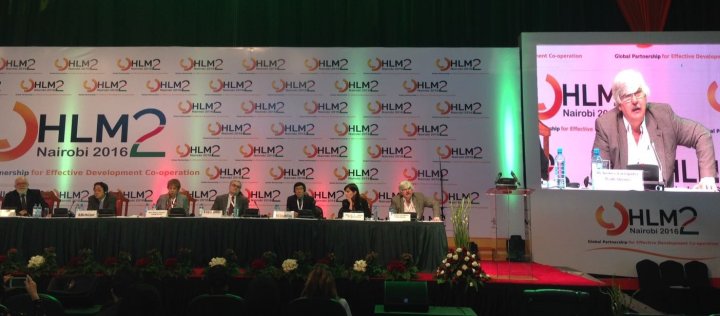
Andrés Larisgoitia, CTA Argentina
In his intervention, Mr Larisgoitia (pictured) highlighted how the principle of inclusive partnerships can contribute to the effectiveness of SSC and TrC, particularly in the fulfilment of a human rights based development. He said inclusive partnerships are essential for effective development that better contributes to the three dimensions of 2030 Agenda. Inclusive partnerships are also essential for South-South cooperation to be sustainable beyond purely technical, industrial or financial cooperation, taking into account the real needs of the populations represented through trade unions and civil society organizations. This inclusion has to be done both in the implementation and implementation of South-South cooperation policies, for which an inclusive multi-stakeholder dialogue is essential. For this, he added, there must be an enabling environment for CSOs and trade unions, which implies freedom of association and expression, but also support for these organizations so that they can participate in equal relations in multi-stakeholder dialogue with all actors involved.
Larisgoitia said trade unions and civil society organisations are no new actors for SSC, and are fundamental actors to make SSC democratic and inclusive. Very often, north-south cooperation fails to guarantee country and democratic ownership, and catering for the needs of developing countries. SSC works to overcome symmetries of the global order, respecting the sovereignty and autonomy of southern countries. He noted that trade unions and CSOs fight for development cooperation modalities based on the Istanbul principles for CSO Development Effectiveness and the Trade Union Principles for Development Effectiveness.
He added that SSC can achieve its potential if there is democratic ownership with participation of CSOs and trade unions in the design, implementation and monitoring of SSC projects. Moreover, an enabling environment for CSOs and trade unions in SSC is necessary to recognize them as development actors, and thus strengthen and foster social dialogue and engage in human rights based development. Last but not least, transparency and accountability are key elements for SSC effectiveness, with access to information for all actors involved.
Finally, Mr Larisgoitia reaffirmed that there are different models of development, and SSC can be an example of a development that fosters social justice, human rights and social dialogue. He took the opportunity to promote the ITUC-TUDCN Global Partnership Initiative on Social Dialogue, launched by trade unions at the HLM2.
Mario Pezzini, Director of the OECD Development Cooperation Directorate (DCD-OECD)
Spoke about the potential of triangular cooperation in relation to bilateral cooperation, in a context where emerging countries have a big role to play in development cooperation. He said development cooperation is not only about resources, but also knowledge and technology transfer. For instance, the Swedish model of social dialogue is difficult to apply in countries with over 70% of informal work, but cooperation can be made to learn best practices. Mr Pezzini said SSC and TrC is demand-driven, and that the important role of unions cannot be emphasised enough, as well as that of CSOs and local authorities. He concluded that SSC and TrC framework needs to include the SDGs principles, and that sustainable development needs to assess a multidimensionality of factors, and not just growth.
Jorge Chediek, Director of the United Nations Office for South-South Cooperation
Spoke about the specific benefits of SSC over traditional cooperation, particularly peer learning and peer assessment. He added that the expansion of SSC has been massive, as well as the recognition of its centrality. We should facilitate the development of new instruments. He noted the 40th anniversary of the 1976 Buenos Aires Plan of Action for technical cooperation among developing countries is a good opportunity to discuss the issues of SSC and TrC at the highest level.
Ana Ciuti, Director for International Cooperation, Ministry of Foreign Affairs and Worship, Argentina:
Endorsed trade unions and civil society as a key actor of SSC and advocated for inclusive partnerships, giving examples of Argentina as partner of SSC, including in forensic investigation, food security and peacekeeping. She admitted that SSC does not mobilise resources of the volume of traditional cooperation, but it does mobilise knowledge and peer-learning.
Gina Casar, Executive Director of the Mexican Agency for Development Cooperation (AMEXCID)
Said ODA cannot be the only resource of development cooperation, particularly when SSC counts for 25bn USD only. Mexico is very much involved in SSC and TrC projects and it is championing a Global Partnership Initiative on Triangular Cooperation at the GPEDC.
Li Xiaoyun, Network of Southern Think Tanks (NeST)
Described how inclusive partnerships in SSC and TrC relate to the other principles of effective development co-operation (country ownership, focus on results, transparency and mutual accountability) particularly regarding the implementation of the SDGs. He added that more institutionalisation of SSC and TrC is needed in the UN system, beyond the UN Office dealing with SSC.
The representatives from El Salvador and Peru, respondents in this session, recognized the role trade unions can play in SSC and TrC.
For more on Trade Unions’ participation in the HLM2, click here

